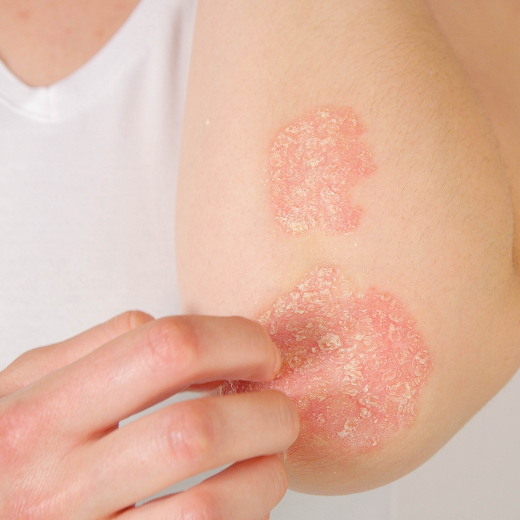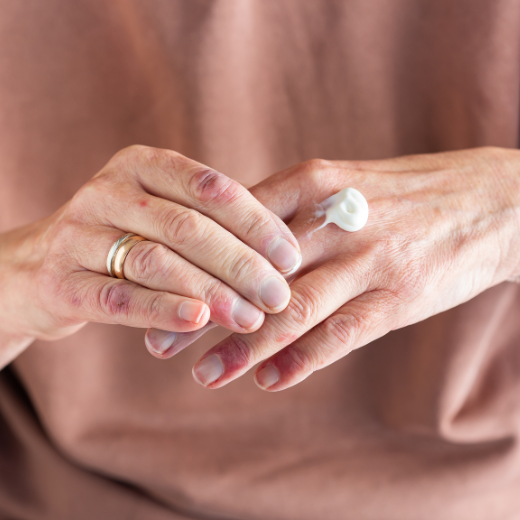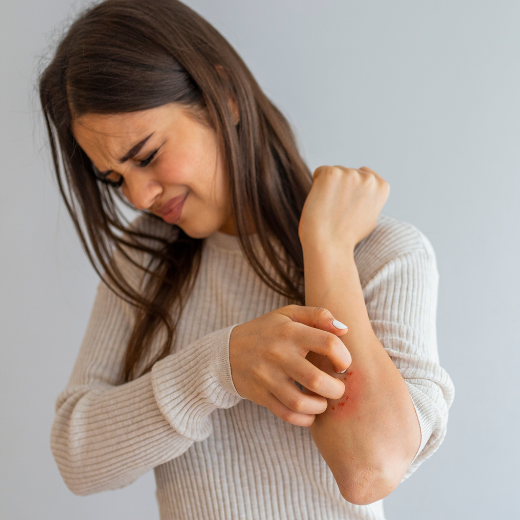Living with Eczema: A Guide to Smoother Skin and a Calmer Mind
Posted by Ellie Swain on Oct 8th 2024
October is Eczema Awareness Month, so we thought it would be the perfect time to shed light on this common but often misunderstood skin condition. If you’ve ever felt the discomfort and frustration of eczema, you’re definitely not alone. More than 31 million people in the U.S. alone struggle with eczema, and the good news is that with the right care, you can manage its symptoms and keep your skin looking and feeling its best. Whether you’re dealing with mild dryness or more intense flare-ups, let’s learn more about eczema, how it affects your skin, and the best ways to care for it.
What Exactly Is Eczema?
Eczema is a common skin condition that causes red, itchy, inflamed patches on your body. For some, it’s just a mild irritation, but it can lead to much more persistent discomfort for others.
The term itself refers to a group of conditions resulting in similar symptoms, but the most common type is atopic dermatitis. This usually starts in childhood but can pop up at any age.
If you’ve experienced eczema, you’re probably familiar with its unpredictability. Some days, your skin might seem completely fine, while other times, it feels like it’s on fire, and no amount of moisturizing seems to help. This rollercoaster can be challenging, but understanding the triggers and how to care for your skin can make a world of difference.
Why Does Eczema Occur?
There’s no single cause of eczema, which is one of the reasons it can be so challenging to manage. Genetics, environmental factors, and stress all play a role. If your parents or siblings have eczema, there’s a higher chance you might have it, too.
Eczema is also common in people with asthma or allergies, which is why it’s often linked to other conditions. But it’s not all about genetics. Factors like cold weather, dry air, certain fabrics, soaps, and even food can set off a flare-up.
And, as unfair as it seems, stress is a major culprit. When you’re feeling overwhelmed, your skin can act up in ways that only add to the frustration.

Caring for Eczema-Prone Skin
When you have eczema, your skin barrier doesn’t function as it should. A healthy skin barrier keeps moisture in and protects against irritants and allergens, but eczema weakens that defense. That’s why it’s essential to give your skin some extra TLC.
Discovering the right skincare routine when you have eczema is key. While it might take a bit of trial and error, once you find products that work for you, your skin will thank you. Start with a gentle cleanser that won’t strip your skin of its natural oils, such as the soothing CLn Facial Cleanser.
Hydration is vital, so slather on a rich, fragrance-free moisturizer to lock in moisture and keep that barrier strong. The Murad Daily Defense Colloidal Oatmeal Cream works wonders for protecting and relieving eczema-prone skin.
And don’t forget the importance of being mindful of your environment. Keep your living space humidified, especially in the colder months when the air is dry. If you’re feeling stressed, make sure to take time for yourself. Practicing relaxation techniques or taking a warm bath can help calm both your skin and mind.
Common Misconceptions About Eczema
It’s easy to feel self-conscious when dealing with a visible skin condition like eczema, but remember that it doesn’t define you or your skin’s beauty. One of the biggest myths out there is that eczema is contagious. You cannot “catch” eczema from someone else, nor can anyone catch it from you.
Another misconception is that eczema is caused by poor hygiene. This couldn’t be further from the truth. In fact, over-washing or using harsh soaps can worsen eczema by stripping the skin of its natural oils. Remember, your skin’s comfort and health depend on being gentle with it and respecting its needs.
Treatments and Triggers
There are various treatments for eczema, from over-the-counter creams to prescription medications. If your eczema is severe, it might be worth speaking with a dermatologist who can offer tailored advice.
But don’t overlook the power of prevention. Keeping your skin moisturized, avoiding known triggers, and managing stress are essential. Sometimes, even changing small habits, like switching to a milder detergent or wearing soft, breathable fabrics, can make a noticeable difference in how your skin feels day to day.
Embracing Your Skin Journey
Living with eczema is a journey. There will be bumps along the way, but you don’t have to let eczema control your life. Understanding your skin’s needs is the first step in taking back control. Give yourself grace when flare-ups occur, and know that with the right care, those rough patches can become smoother over time.
This October, let’s raise awareness about eczema and show our skin the love it deserves. By sharing tips, spreading knowledge, and offering support, we can help each other find the best ways to manage this condition. Whether it’s through discovering new skincare products or simply recognizing that you’re not alone in your eczema journey, there’s so much power in community and self-care.
Discover our full range of eczema-friendly skincare products here.


